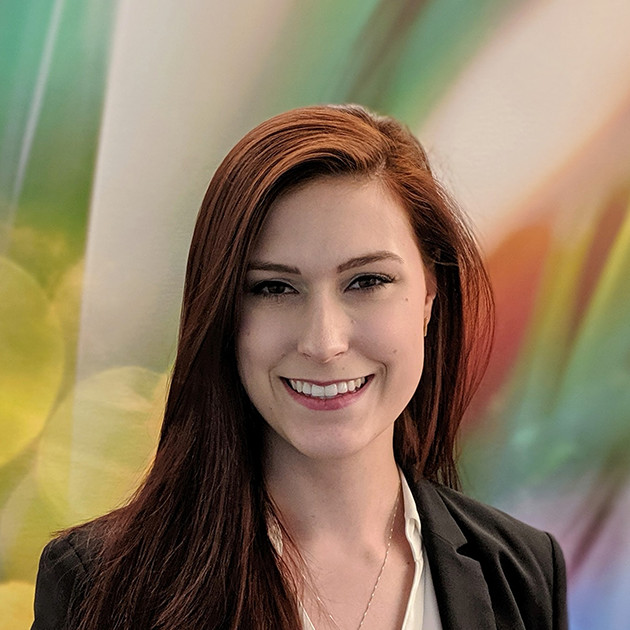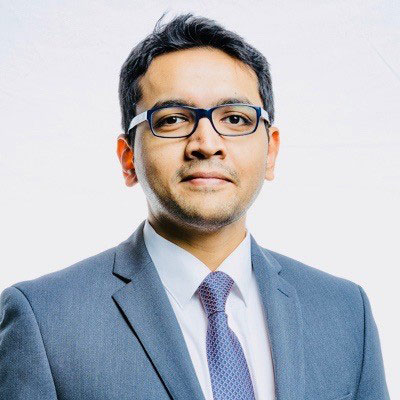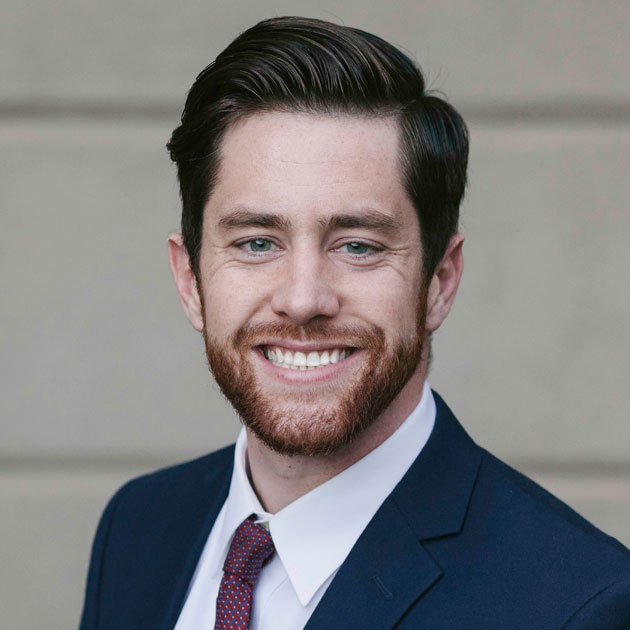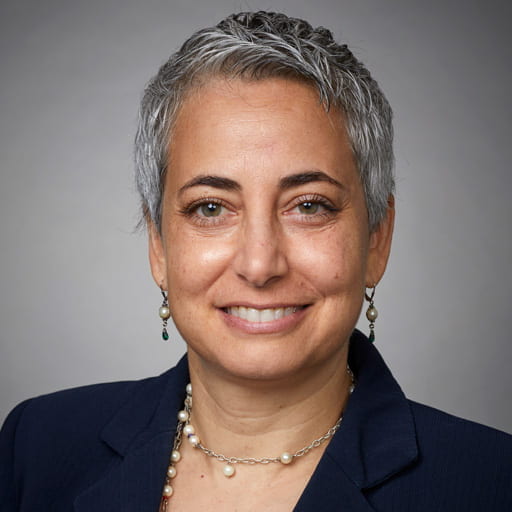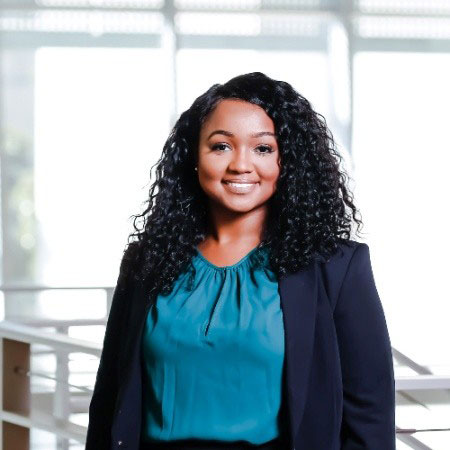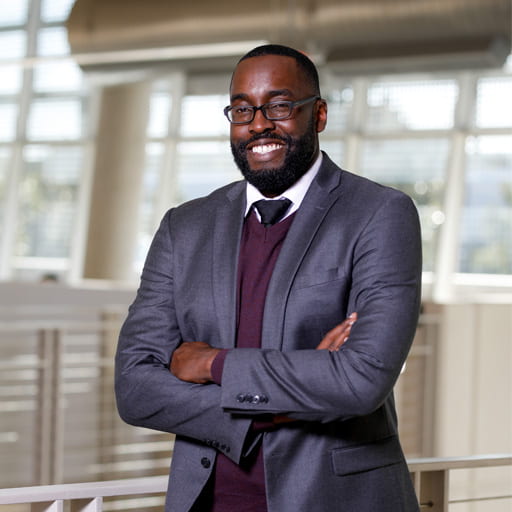
This episode features John Oyedele, MBA’16, senior manager, digital product management in Capital One’s Consumer Mobile division. Oyedele joins host Dr. Monica Powell, senior associate dean and dean of graduate programs at the Naveen Jindal School of Management. Among topics discussed are how he was able to earn his evening MBA — all while maintaining a full-time career and a family life with a wife and four kids — and how doing so gave him the confidence to make the transition from an electrical engineer to a well-rounded management professional.
Transcript
Introductory music plays up through Monica’s introduction.
[Jimmie] This is yet another MBA GOAT, a podcast featuring conversations with a greatest of all time MBA alumni from the new being Jindal School of Management at the University of Texas at Dallas. We’re here to celebrate the outcomes of graduate management education, and to identify remarkable examples of how the MBA program here at the Jindal School has transformed the lives of our alumni. Now here’s Dr. Monica Powell Senior Associate Dean and Graduate Dean at the Jindal School. Take it away, Monica.
[Monica] Well hello there. This is Monica Powell, I’m a senior associate dean here at the Naveen Jindal School of Management at UT Dallas, and I am delighted to have another great visitor to yet another MBA GOAT podcast. I’d like to welcome John Oyedele. He is an amazing electrical engineer transformed into a product management role at Capital One, and he’s going to share with us a little bit about his journey in our evening cohort professional MBA program. John it is great to have you here this afternoon.
[John] Thank you for having me.
[Monica] You know, you’re a unique MBA, here at UT Dallas; you’re a part of our MBA evening cohort group.
[John] That is correct, yes.
[Monica] Which is way different than a full-time student.
[John] I like to think so.
[Monica] We try to kill the evening cohorts a little different than the daytime cohorts.
[Both] laughing….
[Monica] In the sense that you’re fully employed so, so, so tell us about what role you had while you were in the evening MBA program and talk a little bit about how many hours you were taking while you’re in the program?
[John] So I was working for a small smaller consulting firm, Slalom Consulting. I’d been there, almost about four years, and then decided to take the plunge and get my MBA. It was funny because I initially thought, the program would cater to that where you’re not taking a full load, but I quickly learned like no.
[Monica] laughing.
[John] I’m taking a load pretty similar to where the full-time students were taking but um, I mean overall it was, it was a challenge. There’s no denying that but it was able to survive and do well.
[Monica] So John I’m curious, you were in this evening cohort class with other individuals that were all fully employed ;;;
[John] Yes.
[Monica] So can you talk a little bit about the benefit to you and maybe your classmates about being in an environment where everybody has a job?
[John] I think … it’s one of the benefits that comes to mind is like the entire cohort, was there to learn how to apply what we are learning to our jobs. So, the level of questioning was kind of on the same level.
[Monica] So the quality of the questions …
[John] Yeah the quality of the questions were pretty much on the same level, because we’re all trying to figure out okay. So you take marketing. We’re learning about marketing, while we may not be in marketing, we may have some responsibilities related to that so we’re asking like more … how can we apply this? Because these are projects that I need to do at work that I think this could benefit from.
[Monica] So this is a real-world application question, as opposed to a theoretical question that you might get from somebody who is not fully employed.
[John] Yes, we in the cohort, we always believe that we were there to learn how to use this for our job and our next job, while full time were primarily there to get a job. Whether that’s true or not, but that’s just how we approached a lot of our professors is, you know, that’s the theory is great, but okay , we have this sample, we have this example that from work, how would this work here and they the good ones are really help us kind of make that correlation.
[Monica] You know the best phone calls that I get, and I don’t get them more than two or three times a year, but they come from a fully employed student that will call me up on Monday or Tuesday after they’ve been in class the previous week. And they’ll call you and they’re saying, I got my entire tuition return on investment last week and my such and such class because I just landed a big one at work.
[John] Yea, yea.
[Monica] And that’s a really great feeling and when you’re with a bunch of fully employed people I bet that happened on a regular basis, where people would actually ask a question that was a real world situation where they worked and then they got a whole bunch of great feedback and were able to go back and implement that the next day at work.
[John] And also on the flip side they’re bringing in their experiences into the class so again the conversation is just instead of higher, much higher level of consciousness.
[Monica] So it’s a higher grade of dialogue between your classmates. So, so that brings up, you know one other thing I wanted to ask you about. You guys are on in study teams?
[John] Yes.
[Monica] And those team,,,
[John] Yes.
[Monica] We try to intentionally build those teams where they’re representative of a lot of industries and functional areas so that there’s a lot of sharing and caring that’s, that’s going on.
[John] Yes.
[Monica] Can you talk a little bit about how your study team functioned and where you guys met and how often you met?
[John] Oh, that’s a good question. So, we actually we got, we had two study teams, I think we had one for the first semester that we had to break up, which was a lot of heartburn because the program office had a lot of pain for that one, but ended up working out. So we usually because of location and stuff we will try to figure out what’s the best time of the week to meet and where. I think we always landed on Sundays, actually here on campus.
[Monica] Oh wow,
[John] That’s usually when we meet, or even on conference calls. Every once in a while, we’ll go to somebody’s house and have dinner and they’re gonna study for a test or work on a case. But, you know, really just depend on where the group live. I lived in Arlington, so it really didn’t matter where they lived because I was so far away from everybody anyway.
[Monica] You were gonna have to travel anywhere you go.
[John] I was gonna have to travel anywhere I go.
[Monica] But anyway, I would imagine in the course of two different study teams that you were on there were times where you were the tutor or you were being tutored.
[John] Oh yes, yes. I mean because one of the things that comes into play is depending on the class you may have somebody who’s already familiar with it. So in our finance class. No, this person is in finance. Well this is just as a refresher for him so he would definitely provide, he or she would definitely provide the context and kind of guide us through .When we’re dealing with something that’s a little bit more analytical or we’re having …
[Monica] Mathematical
[John] Mathematical than you know, maybe that’s where I would step in because I have a little bit more experience.
[Monica] But you know it’s kind of cool to go through a program, as a fully employed individual where you have these, you know, very diverse teams of individuals representing industries and functions, and to be able to have built-in experts, so you can kind of be your, your MBA guide through the program. I think that’s a really cool feature when you’re in a cohort environment, and everybody is fully employed and fully working.
[John] It was awesome because we got to see where the theory in real life didn’t quite match up, and then we have conversations around it. It’s like, well, that’s not how we do it here at this, you know, in the usually the professors are open to that conversation and, and they can provide context on how that theory came to be and maybe why we have diverted so far from theory in actual practice.
[Monica] Terrific, thanks.
[John] Hmmm
[Monica] So there were about 50 of you in that particular class between 45 and 50.
[John] That sounds about right.
[Monica] And you were taking somewhere between four classes every semester,
[John] but I think the first two semesters we were taking four some of them were like half semesters. And then, usually it’s about between three and four.
[Monica] You got no time off and went every single semester from beginning to end.
[John] Beginning to end. This was the first time I actually ever had to do summer school, so that was a shock and also working full time on doing that. So, yeah, there is no break.
[Monica] I see you are real analytical guy. I’ve been told that you’re just an analytical wizard with an electrical engineering degree from SMU.
[John] Yes, yes I got my undergrad in electrical engineering. started working at Accenture. Though it’s a funny story … started off as computer science at SMU. I did not like coding whatsoever. So to switch to electric engineering after the first year. Graduated, got a job at Accenture, the very first thing they asked me to do is to learn how to code so …
[Monica] laughing …
[John] But ended up working out. I was at Accenture for about six years. I was doing more software development, software engineering, and then moved to Slalom to do more project management project delivery.
[Monica] Did you have a particular goal in mind? When you said okay, John it’s time to go get an MBA. What were you hoping to accomplish in getting the MBA? And I mean you’ve been graduated, for what a year now?
[John] So it was a little bit more than a year, I think.
[Monica] So did you accomplish the goals that you hope to accomplish after a couple years?
[John] I’d like to think so. So the thing going in … the main reason why I wanted to go was because of my engineering background. I didn’t feel that I had a strong business foundation, and just working in consulting, I quickly learned that you need to have, like, just a general level of understanding of how businesses make money to have the right level of conversation. So that was my primary purpose, like, okay, I need to go back and just learn the fundamentals. And then I was also in a place where I wanted to move into product management, which is a different industry than what I was in before, different job or role. And I felt the MBA would help one put me in contact with people who are already in that field and kind of learn about other organizations or other companies in the metroplex that, that had that, that type of opportunity.
[Monica] And you made the switch.
[John] I did, yeah.
[Monica] You’re now at Capital One.
[John] I am a Capital One working as a product manager, and doing that for …
[Monica] Dreams come true …
[John] They do, they do. I have been doing that for about three years now, so it’s been going pretty well.
[Monica] So, I’ve been in graduate management education for a very long time. And when I talk to individuals who have an engineering background, they tend to have a few ‘aha’ moments coming into an MBA program because it’s, it’s really, it’s really not the linear approach of an electrical engineering background. What were your aha moments in the program, and what courses did you all of a sudden as a trained analytical person say, wow, that really changes how I look at business?
[John] I would say it was under the Innovation and Entrepreneurship umbrella. There was two courses. One of them was introduction to entrepreneurship, and the other was market entry strategies. They were, one the of classes were not taught with textbooks, any books that we had were books written by like industry titans in innovation so that was, that was interesting and then heavy on the case studies. So, while it was very analytical it was a different kind, I’m used to like just looking at numbers and coming to a conclusion. But this is looking at scenarios that these different organizations were in and trying to identify the commonalities between them and like what did they do right, what, what could they have done better. So for me, that’s, that’s kind of what solidified why I wanted to move into product management, because a lot of those concepts that were taught, we applied towards, like product management and coming up with a hypothesis and testing it, but it’s all in service of creating a product for your customer.
[Monica] You know when you have that lens to look through, you are, you’re, you’re critical in a different way. And so I imagine that you’re finding that very useful at Capital One.
[John] Oh yeah. Definitely. Capital One is very, very intensive on its data analysis. So that skill set has definitely helped me. So …
[Monica] So well you weren’t alone, being an analytical person here at UT Dallas. I mean the history of UT Dallas is somewhat, you know, brought to us by the founders of T. I. and starting an engineering program and then management came very quickly after that so you weren’t alone in the classroom. There were a lot of other engineers that occupied some of those seats.
[John] Yeah, we had quite a few other engineers, but one thing I really enjoyed is, it was very diverse …at one point we had a former opera singer, right, we had peace officers, we had teachers, so a lot of what we had quite a few people in the medical field so it was, it was interesting to be in. You know, a finance class that people are bringing their own perspective from their own area of expertise and into that class.
[Monica] You know, we take pride here at UT Dallas about our diversity, and it really is true.
[John] Oh yeah definitely. From day one, I was I was very impressed.
[Monica] So you must have gone through a really interesting process to think about, you know, where am I going to go get an MBA? I mean you have a lot of choices in the Dallas/ Fort Worth market. So was that hard for you to make a decision because I know you know UT Dallas is very, very different than SMU. I mean, first of all you’re talking about a private school versus a public school, and a very small private school versus a very big public school. So can you can you share with us kind of the thoughts that you had about making a decision to come here? And, and why this ended up being such a good fit for you?
[John] Ummmm I’ll be completely honest, the primary driver was finances. SMU is a great school went there for my undergrad, but I couldn’t justify spending that much on MBA, I just didn’t really, the cost versus value analysis I did in my head, it just didn’t compute. And you know given other constraints ahead, like, I can’t take, uproot my family and go down to UT Austin or anywhere else, UT Dallas seemed to be like the best fit for my situation. And looking into the program that was definitely highly rated, and I really liked the flexibility with the evening program and being able to take advantage of other opportunities on campus, just seemed like a good fit overall.
Introductory music plays up through.
[Jimmie]This episode is brought to you buy the UT Dallas MBA programs top ranked nationally and in Texas, the UT Dallas MBA combines a real plus score with 13 concentrations. You have an option to add a second master’s degree in your choices that The MBA program has full time, part time online and other formats will give you flexibility to fit your MBA education into your busy schedule. The skills and training you will receive are what top employers are looking for. For more information, visit us online at Jindal@ UT dallas.edu/MBA.
[Monica] A lot of folks that are out there, hopefully listening to the podcast, don’t realize that if you come in as a fully employed student, you have a lot of different options you can do the evening cohort, which is going through a program with a whole group of people going through your core together, but also we have the flex program where you’re just going at a buffet style.
[John] Exactly.
[Monica] And then the online on top of it – but as a, an evening cohort or as a flex student, you can take advantage of an online class. Did you do an online class?
[John] Oh, I did a couple of them, specifically in the summer. I can’t remember which one but I did about two or three online classes.
[Monica] And how did you how did you feel about that experience? Did you feel like what you got out of that online class was as relevant as it would have been if you’d been an on campus?
[John] Oh, me personally I prefer on campus, because I like the interaction with their classmates and the professor, but as far as the content and being able to understand the material, they’ve worked fine. The professors make themselves readily available, but there is a difference between “just in the moment” when you’re having those discussions and being able to, you’re kind of keying off other people’s questions and you know …
[Monica] It’s really a different kind of learning style.
[John] It really is.
[Monica] When you’re an online format you kind of have to call upon attributes differently than you would if you were face to face in the classroom.
[Monica] So you know, when I’m talking to students and to alumni, you know I’m always curious about what surprised them the most when they came to UT Dallas. What when you got here, what really surprised you the most? You were like, wow, I wasn’t expecting that.
[John] Hmmm. So, I think the level of support that we got from the program office. And it wasn’t that I wasn’t expecting. It wasn’t like it wasn’t I didn’t come in, not expecting any support I was just really surprised at the amount, how far they go above and beyond to make us feel comfortable, like they definitely understood our plight of, we get off at 5:00, and we’re hitting traffic and we got to get here by 5:30. You know, giving us simple things like coffee, like, that went a long way. And then really going out of the way to create enable us to create relationships with each other. I think they just really knocked it out of the park. I know they continue to improve year over year.
[Monica] We call that the gold standard of service….laughing.
[John] Right, they do a great job.
[Monica] That’s good to know. I know that now that you’ve completed the MBA and you’ve gotten half of your life back, I’m sure you’ve had quite a long list of things that you need to accomplish on the home front that got neglected for the years that you were in the MBA program but now that you’re, you know, over a year out of this program and you’ve gotten your bearings again. I’m sure you’re keeping up with the news and kind of what’s happening in the MBA world. You know there’s a lot of talk about, you know, that the value proposition of the MBA just isn’t as strong as perhaps a master’s degree in a specific content area, like Business Analytics. Now, you may not have but your classmates took advantage of the MS/MBA, where they combined the, the evening MBA program with an MS, and they graduated with both of them. It took a semester longer to do that. But, but what do you think about the value proposition of the MBA? And if you, if you were going to talk to people who are out there thinking about, you know, do I go get a specialty Master’s in Business Analytics or Information Technology Management or, you know, Innovation and Entrepreneurship, Accounting, Finance, versus getting an MBA? What argument would you make to them about the validity of the MBA and how it’s still very much plays for you in the marketplace?
[John] I guess the way I look at it is, if you know you’re going to specialize in that particular field for your entire career, and by all means, but the MBA gives you a foundation that allows you to be able to maneuver in various contexts. I know enough about marketing to be dangerous, although that’s not my, that’s not the field I’m in. I know enough about finance. I know enough about accounting and then those foundational things to where I can get into that environment and be comfortable. Now obviously I’m not the expert, but I know that the right questions to ask, and I know I could probably lead an organization in that area and do well, as, as I learned. I think it also depends on where you’re coming from. I think, for me coming from an engineering background where the level of foundation that I had regarding business methodologies and all that was pretty low. It’s hard to argue the value prop of an MBA, and I know what it’s done for me, and I’m a proponent of it, with the caveat is you have to go in with a plan. If you’re going in blind, or with this expectation that the MBA will fix everything, I think that’s where we need to have a conversation about realistic expectations.
[Monica] So you have to be very realistic about what you can expect. I imagine at Capital One having an MBA gives you more credibility in the conversations that you have. How has it changed how you conduct business? And how you make your arguments prior to having the MBA?
[John] Know there’s a level of confidence that I have, because I feel like I know what I’m talking about, because, you know, business, surprisingly has not changed that much as far as the foundations go. So I’m going in with a lot more confidence. I’m going in more prepared because I know how to prepare for something that MBA definitely requires you to learn how to do that. But I think that’s the main thing is just that there’s a level of confidence that I have going into these various conversations.
[Monica] Do you feel like that gains you any credibility with your colleagues?
[John] Um, And I’m sure it does, I don’t I don’t tout that I have MBA. Some colleagues know that I do. Some don’t. I think when they ask that, I’ll tell them, but I can’t tell you for sure. If their level of respect for me increases because they know I have MBA.
[Monica] Well you sure as heck are popular because your face is all over DFW.
[John] Laughing…
[Monica] So, so let’s just go ahead and talk about, you know, I was walking through DFW International Airport, you know, catching a plane, and I’m walking down the terminal and there’s this giant picture of John’s face. So and I see it in the kiosks I’ve seen it on boards, so. So how has that changed you?
[Both] Laughing…
[John] So it’s funny because I am somebody who does not like attention. I had no idea would be that big.
[Monica] So, 12-foot head!
[John] Yes, so I didn’t see it for the longest time, well I mean I, the program office sent me pictures of it, but I actually didn’t see it in person until almost six months afterward, but I kept getting text messages, or I’ll be on campus at Capital One, and I was walking by somebody who I’ve never met and they’re just staring at me. And there’s one guy he actually stops, like “Hey, have I seen you before.” The airport? Yeah, yeah that’s, that’s me.
[Monica] Laughing.
[John] If anything, brought some attention to me that you know it’s fine.
[Monica] Well before you leave today I’m gonna have to get your autograph!
[Monica] Laughing.
[Monica] You know when I was talking to the program office and preparing for today’s conversation, you know they talked about you being like Mr. Chill in the classroom and that you were the relaxed guy, where everybody else is, you know, freaking out about the finance exam, and John sitting back there just looking cool as a cucumber. So, how did you maintain that, that persona while the program was going on? Because I mean we do sort of pride ourselves in giving our students an intense program. I mean if you’re going to be in the evening cohort. That’s actually really the hardest program you can be in, you’re working more than 40 hours a week. You’re taking you know, four classes at one time. In your case, you had four children and a spouse. I don’t know if you had any dogs or cats on top of that equation.
[Both] laughing….
[John] As far as, so I probably because I’m freaking out at home before I get there. But I think a lot of it is. I had a lot of support now from my wife, and was able to kind of set up some semblance of a routine that would allow me to manage and time commitment that I need to put in for the program to work. And so a lot of it, but every time I’ve done a panel, I always especially for people who want to do the professional. So if you have a spouse or whatever the situation is, they’re getting an MBA too, they have to go and understanding that the level of commitment that you’re putting in, they are gonna have to put in other ways and you need to make sure you communicate that and definitely show appreciation. So.
[Monica] You know, I think a lot of young people, young professionals, who come to the University to explore the proposition of getting an MBA, oftentimes have trouble, pulling the trigger.
[John] Yeah.
[Monica] Because they’re trying to over manage or over control all the aspects or have everything lined up perfectly so that they can go and do it. And we all know that life happens, and you can’t control it. So, what kind of advice would you give to that prospect? Who knows that it’s going to have an effect on the bottom line, not only in terms of the satisfaction of the job that they can then become qualified for, but satisfaction in terms of increased earnings? We see tremendous increased earnings for our students after they get the MBA, and I’m sure that was the case for you, but, but also kind of the other impact so what would you say to that student who’s just trying to make it perfect that won’t pull the trigger? How can we get them to pull the trigger?
[John] It will never be perfect. I mean you can plan all day long, but life will definitely throw a wrench in those plans. I think if you can, if you can point to like your why … Like why are you getting this MBA? Right? And if you feel that’s a strong enough reason, you know, go for it. It’s what I like about, because the program is flexible. It’s you can start off with a professional. But, life happens, things get in the way, so will maybe you move to the flex and maybe you just take online, we had people who did that in our, in our cohort. I think at the end of the day if you feel like the reason why you’re doing this is valid and validated and you strongly believe in it, then go ‘head and pull the trigger. It’s…
[Monica] Absolutely we tell them that all the time. Now, you have four children, your oldest is a young man, and then you have a daughter and then you have a set of twin girls. Correct?
[John] I do..
[Monica] Okay, so they watched you go through this program, and I am sure that them watching you had an effect on them. So can you speak to the impact it had on your family, your kids, your spouse, your colleagues?
[John] Laughing…Oh on the kids? It’s hard to say. I mean they, from their perspective, they knew I was coming home late because I was in school, and I think especially with the younger ones they had to … I had to explain like no there’s school after school.
[Monica] School.
[John] Yeah, after school right.
[Monica] And you have homework a whole new way.
[John] Right… I think that you know they just saw that I was going through that, and I’m sure how other house that they were affected. For my wife who was, you know, she was definitely affected because she had to kind of pick up where I was kind of leaving stuff for her. So, but you know, like I said earlier the commitment is not singular it’s if you have a family. They all kind of have to take that commitment with you and they are impacted. And it’s up to you to recognize that and make sure you show appreciation. So….
[Monica] Well John, we’re really proud of you. If you could, if you could put into to one phrase, the impact of getting the MBA here at UT Dallas well what would that be? What would you say that the greatest impact to you has been?
[John] Wow, One phrase …. I’m leaning towards you know the MBA gave me the confidence. I need to go after what I really wanted from a professional perspective.
[Monica] So in hindsight you do it all over again! Right? Laughing… Not those 20-hour days or those finance exams.
[Both] laughing …
[John] You know, I would, because of the way things worked out.
[Monica] Is there one particular class you just, we couldn’t pay you to retake?
[John] Oh, do I want to say that?
[Monica] Oh, oh there’s one for every MBA.
[John] Oh, so what was the class? There was a statistics class that I don’t think any of my, anybody in my cohort enjoyed.
[Monica] OPRE 6301.
[John] That sounds, yes …That is the one.
[Monica] For an engineering guy that you could have done that one in your sleep.
[John] If it had been a while. And it’s, we just, you know, out that we just did not connect with our professor.
[Monica] Yeah, sometimes that’s a challenge. You know we tell students all the time that that when you go through an MBA program, it’s like having, you know, you know,40 bosses, 40 different bosses with 40 different leadership styles, communication styles, management styles, and some of your bosses you’re going to love and some of your bosses, you’re not going to be as fond of. But you’re going to learn something from every single one of those bosses.
[John] That is true. That is very true.
[Monica] So you probably learned a lot in that class.
[John] Oh yeah, yeah.
[Monica] Even though it’s a little painful, I would have to agree with you from my own vantage point. All of those statistics classes that I took are probably the ones that left scars on my personality and otherwise.
[Both] laughing …
[Monica] Well, we are, we are so proud of what you have accomplished at Capital One. We you know, we I, love seeing your face everywhere. The number of phone calls that we get, you’re, you’re an individual that comes from a diverse perspective, and the confidence that that has given our diversity applicants has been absolutely terrific.
[John] Well, that’s good.
[Monica] And, and so I’d like to really applaud you for being courageous enough to let us use your 12-foot face all over our ads because it’s made a difference for our applicants, and we’re really grateful for that. So, congratulations to you, and I hope that you will always think fondly of UT Dallas. And you’re obviously a great ambassador, and we love being able to say that you’re one of our UT Dallas MBA G.O.A.T.
[John] Well I am very flattered. Thank you very much.
[Monica] Well thank you John. We appreciate your time.
[Monica] Thank you so much for listening to today’s podcast. I hope that you were inspired by the words you heard from one of our greatest of all time, MBA G.O.A.T.s. If you were inspired to think about getting an MBA degree, I hope that you will be in touch with us. Give us a call, drop us an email, hop on our website. Be in touch with us so that we can help you make a difference in your future. We look forward to hearing from you.
[Jimmie]Thanks for listening to this episode of Yet Another MBA G.O.A.T. Podcast.
Join us online at mbagoat.com to find episode notes, links and more. Be sure to subscribe to Yet Another MBA G.O.A.T. podcast on Apple Podcasts or your favorite podcasting app. If you like what you hear, please leave us a 5-star review. That will help spread the word about the podcast and the Jindal School’s MBA programs. To learn more about The Jindal School’s MBA Programs, visit us online at jindal.utdallas.edu/mba.

